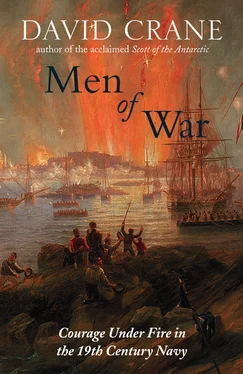Almost nothing is left now of Willesley – the ornamental lake, the contours of an eighteenth-century landscaped park – but a Vanbrugh-esque stable gateway of Cyclopean proportions gives some idea of what Sir Charles Hastings took on when the family returned to their ‘ruined mansion’. A surviving estate book underlines how seriously he took his duties, but if he did all he could to indulge his wife’s and his son Charles’s passion for the place, he remained at heart the man of affairs he had always been, stoically resigned to finding himself dependent on the London mail or a sight of his boy, Frank, for proof that there was a world beyond his Willesley exile.
He was determined, too, that Frank’s future should not be forgotten while he was at home, taking on the best mathematics tutor that he could find for him; but by the beginning of January 1807 the Sea Horse was being fitted for sea and the end of the holiday was in sight. ‘I have been much more interested about the brilliant exploits of Sir J. Duckworth in the Archipelago, or rather against the Porte,’ Sir Charles wrote rather prematurely to Warren Hastings on 17 April, after the Sea Horse had been diverted from the Far East to the Mediterranean to face a growing Turkish threat in the Aegean, ‘and if it is true that he has forced the Dardanelles and destroyed the whole Turkish navy – Lady Hastings may sleep in peace for she has been much alarmed at the boy going up the Mediterranean and being taken by one of their corsairs and perhaps undergoing a certain operation that would fit him more for the Seraglio than the Navy.’
Frank was well out of the dismal failure of Duckworth’s expedition, and if he had had to forgo Warren Hastings’s Eastern patronage, the Hastings name worked just as well closer to home. ‘I have much pleasure in acquainting you your Dear Frank is in the highest health and spirits,’ General Sir John Smith, an old colleague of Frank’s father on Sir Henry Clinton’s staff during the American War of Independence, wrote from Gibraltar on 21 July: ‘he dined with me about ten days since and Sailed again two days after to join Lord Collingwood … I beg my Dr Sir Charles will rest assured that his old academical fellow poet – Jack Smith – will make a point of paying all possible attention to his son Frank Hastings and that he shall have a mother in Mrs Smith when necessary – anything you may wish to send him – direct to my care and he shall receive it safe.’
With the inevitable lag in news there would always be something for Lady Hastings to worry about, and Mrs Smith was already too late with her motherly attentions. ‘We are just returned from a rather successful cruise,’ John Stewart, another bold, intelligent and talented frigate captain, who had circumnavigated the globe with Vancouver , had written to Sir Charles a fortnight earlier,
and going to sail again in search of Lord Collingwood, who we conclude is gone up to attempt what I expect he will not succeed in, as the French influence will keep the Turks in a warlike temper … We have been unlucky enough to lose a Lieutnt last cruise he was killed in a boat by a round shot which also took the arm of little Lord John Hay [aged fourteen] both of which things vexed me … the former however could not have been prevented, but the little boys were expressly forbid going, I found young Hay had been a favourite of the poor Lieutnt [Young], & had been smuggled into the boat. *
The incident was not enough to stop Hastings stowing away in the ship’s boat just five days later – ‘I gave him a scold but could not be very angry,’ Stewart told Sir Charles – but a Mediterranean frigate was no place to hide a boy. The injury to Hay had occurred in the Hyères Roads while the Sea Horse was engaged with an enemy bombard and merchantman, and over the next two years she was in constant action, exchanging fire with shore batteries at Barcelona, cutting out French vessels, capturing the castle of Pianosa off Elba or destroying magazines and guns in a brilliant raid on Isola di Giannutri in the Ligurian Sea. ‘All our frigate captains are great generals,’ an exhausted but grateful Collingwood, the commander-in-chief in the Mediterranean, wrote: ‘… they have taken seven forts, garrisons, or castles, within the last two months, and scaling towers at midnight, and storming redoubts at mid-day, are becoming familiar occurrences. It is really astonishing, those youths think that nothing is beyond their enterprise, and they seldom fail of success.’
There could have been no better theatre for Hastings to learn the importance of this brand of warfare, and with the exception, perhaps, of Cochrane, few abler teachers than Stewart. In the scale of European events these victories might have seemed little more than pinpricks, but quite apart from the effects on national morale, the mayhem caused along the French and Spanish coasts by ships like the Sea Horse or Imperieuse demonstrated that under the right command naval power could exert a strategic influence on land warfare out of all proportion to numbers or firepower.
Hastings would never be averse to the kind of verve and élan that characterised these operations – the Kangaroo demonstrates that – but there were other lessons, too, of a dourer and more professional kind, that he was taking in. At the age of fourteen he had served under two captains of very different temperaments, and if there was one thing he had learned from both, it was that if there had to be war – ‘the art of killing in the most speedy way possible’, as Hastings bluntly put it – then it had to be fought with all the ruthlessness and efficiency that could be mustered.
Implicit in this credo was the conviction that the end justified the means – fireships, mortar ships, ‘stink vessels’, hot shot, anything – because wherever the Battle of Waterloo was to be won, Trafalgar had most certainly not been won on the playing fields of Eton. ‘The objection of unfair is so ridiculous, and so childish,’ Hastings would again write, haughtily showing just how well he had absorbed the lessons of the Mediterranean, ‘that I should consider I was insulting the understanding of the public by mentioning it, had I not heard it reiterated so often, and by people whose opinions go for something in the world … I have heard pretenders to humanity talk of the cruelty of hot shot, shells, etc; it really appears to me the superlative of cant to talk of the art of war (or, in other words, the method of killing men most expeditiously) and humanity in the same breath.’
This might have been Cochrane talking, and with the political situation deteriorating – Portugal under threat, Turkey and Russia (a nigh impossible ‘double’) both hostile, Denmark implacable, Sicily in danger, America muttering, France threatening the Ionian Isles and Britain without an ally to her name except the bizarre Gustavus of Sweden – Hastings would have found few dissenters in the Mediterranean Squadron. ‘We have been out from Syracuse ten days looking after the Toulon fleet which is expected to be making for Corfu,’ Captain Stewart – as ever spoiling for a fight – wrote to Sir Charles Hastings. ‘Thornbrough is following them up & Ld Collingwood (with whom we are) sitting in their route, our force is five of the line, myself & a brig; theirs five of the line, four frigates & several corvettes besides transports in all 20 sail, we are full of hopes and ardour & night or day they are to be attacked the moment we can meet them.’
Stewart was disappointed of his ‘Toulon Gentlemen’, but by the time he wrote – 11 January 1808, dated ’07 in error – the Sea Horse was in the eastern Mediterranean and facing a very different kind of challenge. Towards the end of the previous year Collingwood had negotiated an arrangement with the Porte to exclude Turkish warships from the Aegean, but as the Greek islanders took advantage of their masters’ absence and Anglo-Ottoman relations hovered somewhere between war and peace, the Sea Horse found herself the solitary British presence in an exclusion zone that the Turks had no intention of honouring. ‘You will expect me to say something about the Turks,’ Stewart told Sir Charles, warming to a subject dear to every frigate captain’s heart – prize-money –
Читать дальше











